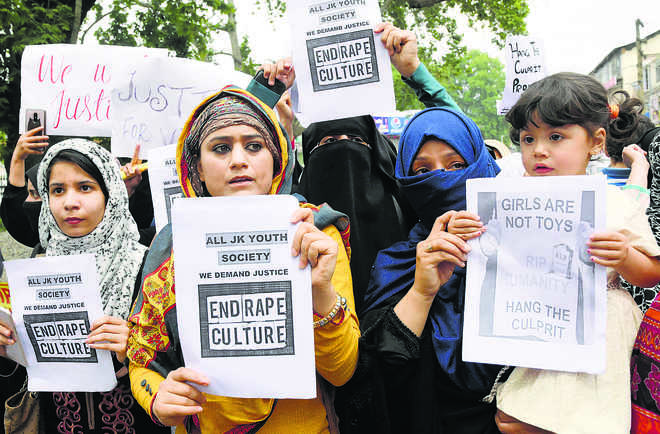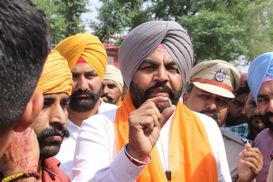
Forgotten element: Crime victims have to navigate through an indifferent system.
GS Bajpai
Professor, National Law University, New delhi
Pathways to justice are always arduous for the victims of crime in India. It took 17 years of agony and perpetual victimisation and a complete disruption of personal life until April 23, 2019, when Bilkis Bano, a survivor of group rape and communal riots, earned an entitlement of a Supreme Court order awarding her compensation.
The award of compensation to Bilkis Bano was lauded widely and the Supreme Court also received a lot of appreciation in sections of the media. The other side of this story is hugely discouraging.
Not a surprise as a victim of crime in this country remains at the mercy of the state and its institutions. The compensation in case of Bilkis Bano is not a matter of celebration, rather an occasion to critically examine our criminal justice system (CJS) which fails to deliver justice for the victims of crime in ordinary course and the apex court of the country has to come into play to award compensation
The crisis point is the poor implementation of the victim compensation scheme as provided under section 357A of the CrPC. The idea of the Supreme Court or High Courts intervening in the matter of compensation by way of remedies under Article 32 or 226 is an exceptional and tardy process for the victims of crime. Keeping this in view, a statutory compensation scheme was brought in under section 357A of the CrPC. Accordingly, victims of crime and the like now have a right to seek compensation from the state for loss or injury as a result of the crime and rehabilitation. The provision of interim compensation is also added in it. The offender need not be identified, arrested, tried or convicted in order to award compensation by the court. The District Legal Services Authority in the states has been empowered to disburse the compensation on the recommendation of the courts.
The victim compensation scheme in India has not really taken off. The National Crime Record Bureau (NCRB) report (2016) suggested that only 38,947 cases of rape were reported in the country. A report submitted by NALSAR to the Supreme Court in 2018 pointed out startling figures— that only 5-10 per cent of the sexual assault victims across the country get compensation under the various schemes set up by the government. Prior to the compensation granted to Bilkis Banu, a sum of Rs 10 lakh was awarded as
the highest monetary compensation to the victims of crime.
Going by the spirit of the UN Declaration of Victims of Crime and Abuse of Power, 1985, the case of Bilkis Bano falls short of expectations. This Declaration, a moving spirit behind the massive victim-centric reforms across the globe, prescribes a right-based comprehensive assistance to the victims of crime on a statutory footing. The CJS in India has failed to capture the spirit of the UN Declaration in its functioning for the victims of crime.
The anguish of Bilkis Bano is not an isolated case as it is a reflection of the way the CJS treats victims of crime in India. Victims of crime are a forgotten element and a marginalized person in the process of criminal justice. Victims have to navigate through an indifferent system which often subjects them to 'secondary victimization' on ac-count of the treatment meted out to them by the police, prosecution and courts. This experience discourages the victims even if they manage to get a paltry sum by way of compensation from the state.
The process to avail compensation in India remains a major issue. Restrictive eligibility criteria, long ambiguous procedure followed by fund disbursement unfortunately forces the victims and their family members to lose faith in the CJS. This is in contrast to countries like the UK where the decision to award compensation is made within 12 months by the Criminal Injuries Compensation Authority (CICA) and Criminal Injuries Compensation Appeals Panel (CICAP). Surprisingly, 50 states are operating the compensation programme in the US. Under the ambit of victim support and assistance, interim compensation is also introduced. However, the success of it still remains debatable in India.
The final award of compensation is linked with the conclusion of trial. And trials are never quick in this country which means the compensation will also be delayed in the same proportion. With more than 400 fast track courts specifically for rape cases, speedy justice to rape victims remains a far cry. The NCRB (2016) reported 1 33,000 cases of rape awaiting trial.
In response to support for the victims of crime, various schemes like "Compensation Scheme for Women Victims/Survivors of Sexual Assault/other Crimes (2018) initiated by NALSA and special funding arrangements like Central Victim Compensation Fund (CVCF) were introduced. However, the implementation of these initiatives is a major problem. Lack of awareness could be seen in the number of crime victims availing such schemes, the Bilkis Bano case being a classic example. If we adopt the UK-based system and notify the victims of crime within the prescribed period, the burden on courts would be less and faster. In cases where the accused is not found guilty or is not traced, the victim needs to be rehabilitated and recommendation may be made by the court for compensation. Bilkis Bano struggled for both.
Non-invoking of the provisions of compensation enshrined in Section 357A of the CrPC by the trial courts is also a serious concern. Criminal courts are not yet alive or properly sensitised to the mandatory duty declared in the case of Ankush Shivaji Gaikwad v. State of Maharashtra (2013 and Manohar Singh v. State of Rajasthan and others (2015). In these two leading judgments, the apex court ruled that the trial court judges are under mandatory duty to apply their judicial mind to each case of crime for awarding compensation.
The need is to amend the code of criminal procedure to bring about clarity on the substantive rights of the victims to compensation by: (a) elaborately laying down statutory guidelines so as to standardise the quantum of compensation (to the extent possible) depending on the nature of crime and its deleterious effect on the victim, not leaving it to the discretion of the executive; (b) providing in the written text of law and obligation of the criminal court to consider the award of compensation by suitably inserting a clause to such effect in Section 360 which is a reminder about the need to apply benevolent provisions of release of the offender on probation; (c) introduce formal mechanism of victim impact assessment to bring in objectivity and consistency in deciding the quantum of compensation.
Constitutionally speaking, victims are entitled to the mechanisms of justice and prompt redress for the harm suffered. Consequently, the need is to create a National Victim Services Authority as a federal institution with state-level framework to organize victim services more professionally.



























